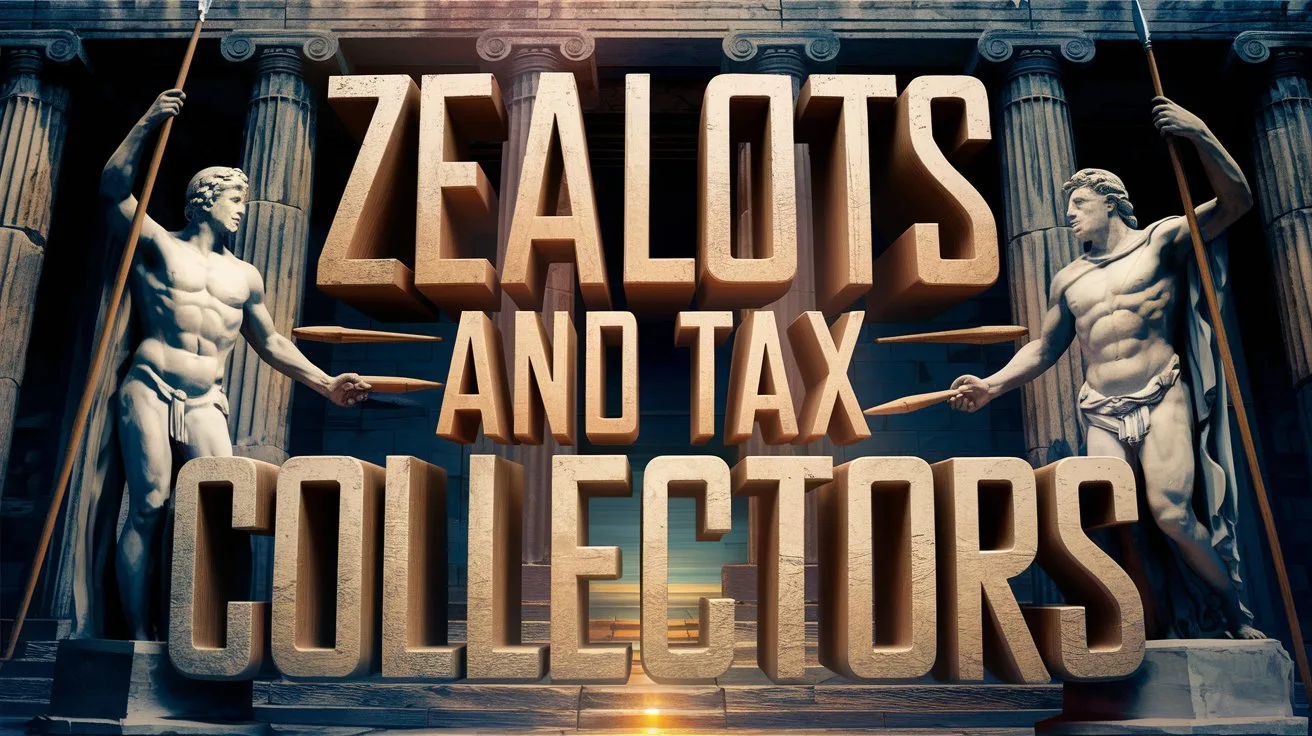Taxes have always been a sore subject. Nobody likes paying them, and in Jesus’ time, they were more than just a financial burden; they were a symbol of oppression and betrayal. Some Jews, like the Zealots, refused to pay taxes to Rome, believing it was an act of treason against God. Others, like the tax collectors, embraced the system and made money off their own people.
When Jesus was asked about paying taxes to Rome, He didn’t give the answer they expected. Instead, He pointed to a greater reality—not just about money, but about who we belong to.
Who Were the Zealots?
The Zealots were a radical Jewish sect that fought against Roman rule. They took inspiration from the law in Deuteronomy 17:15, which commanded Israel:
“You may not set a foreigner over you, who is not your brother.” (Deuteronomy 17:15)
They believed that submission to Rome was a violation of God’s law and that Israel should have no king but Jehovah. Some even resorted to violence, assassinating Roman officials and Jewish leaders who cooperated with the empire.
This movement had been brewing for decades and would eventually lead to the Jewish Revolt (66-73 AD), a war that ended with the destruction of the temple, just as Jesus prophesied:
“Do you not see all these things? Assuredly, I say to you, not one stone shall be left here upon another, that shall not be thrown down.” (Matthew 24:2)
One of Jesus’ disciples, Simon the Zealot, had been part of this movement (Luke 6:15). Yet, rather than fighting for Israel’s political freedom, he found himself following the One who came to bring a greater kingdom (one not of this world) (John 18:36).
Who Were the Tax Collectors?
At the opposite end of the spectrum were the tax collectors, also known as publicans. They worked for Rome, collecting money from their own people. They were notorious for corruption, taking more than required for their own profit. This is why they were despised:
“Tax collectors also came to be baptized, and said to him, ‘Teacher, what shall we do?’ And he said to them, ‘Collect no more than what is appointed for you.’” (Luke 3:12-13)
The Jews saw tax collectors as traitors and unclean, often grouping them with sinners:
“Now it happened, as Jesus sat at the table in the house, that behold, many tax collectors and sinners came and sat down with Him and His disciples.” (Matthew 9:10)
Yet, one of Jesus’ own disciples, Matthew, was a tax collector. When Jesus called him, Matthew left everything and followed Him:
“As Jesus passed on from there, He saw a man named Matthew sitting at the tax office. And He said to him, ‘Follow Me.’ So he arose and followed Him.” (Matthew 9:9)
The fact that Jesus called both a Zealot (Simon) and a tax collector (Matthew) into His inner circle is profound. These men would have been natural enemies, yet in Christ, their worldly allegiances were set aside.
Why Were Roman Taxes So Hated?
Taxes in the Roman Empire were not just financial burdens; they were symbols of foreign control. The Jews resented Roman taxation for several reasons:
It funded their oppressors
The money collected went to pay for Roman soldiers, idols, and even the emperor’s lavish lifestyle.
It violated their national identity
Many Jews believed that paying tribute to Caesar was an admission that he was their ruler, not God.
It was corrupt
Tax collectors often took more than required, as seen in Zacchaeus’ confession:
“If I have taken anything from anyone by false accusation, I restore fourfold.” (Luke 19:8)
The Pharisees and Zealots opposed Roman taxation, believing that it compromised Jewish loyalty to God. This is why the question of taxes was such a perfect trap for Jesus.
The Pharisees’ Trap: Should We Pay Taxes to Caesar?
One day, the Pharisees and Herodians came to Jesus with a trick question:
“Tell us, therefore, what do You think? Is it lawful to pay taxes to Caesar, or not?” (Matthew 22:17)
This was a no-win question:
If Jesus said “Yes, pay taxes”, the Jews would see Him as a traitor.
If He said “No, don’t pay”, He could be arrested for rebellion.
Jesus saw through their deception and turned the question back on them. He asked for a denarius, the Roman coin used to pay the tax. Holding it up, He asked:
“Whose image and inscription is this?” (Matthew 22:20)
They answered, “Caesar’s.”
Then Jesus said: “Render therefore to Caesar the things that are Caesar’s, and to God the things that are God’s.” (Matthew 22:21)
With this simple statement, Jesus completely avoided their trap while teaching a deeper truth.
What Did Jesus Mean?
The Coin Bears Caesar’s Image—So Give It to Him
The denarius had Caesar’s face stamped on it. It was his currency, his government, his economy. If he demanded taxes, then let him have it. This was not an endorsement of Rome, but a recognition that earthly governments have a legitimate (though limited) role. Paul later reinforced this:
“Render therefore to all their due: taxes to whom taxes are due, customs to whom customs, fear to whom fear, honor to whom honor.” (Romans 13:7)
We Bear God’s Image—So Give Yourself to Him
The coin bore Caesar’s image, but we bear God’s image:
“Then God said, ‘Let Us make man in Our image, according to Our likeness.’” (Genesis 1:26)
Just as the denarius belonged to Caesar, we belong to God. Taxes may be a reality of life, but our true allegiance is to the One who created us. This was the deeper truth Jesus was pointing to: The government may have a claim on your money, but God has a claim on your soul.
My Final Thoughts
The Zealots thought the answer was rebellion, the tax collectors thought the answer was compromise, and the Pharisees thought they could trap Jesus with politics. But Jesus didn’t side with any of them. Instead, He reminded them (and us) that while we live in this world, we belong to a greater kingdom.
Yes, we should be responsible citizens. But at the end of the day, our allegiance is to God above all else. So, give Caesar his coins. But give your heart, your worship, and your entire life to God, because you bear His image.





 Get the book that teaches you how to evangelize and disarm doctrines from every single major cult group today.
Get the book that teaches you how to evangelize and disarm doctrines from every single major cult group today.